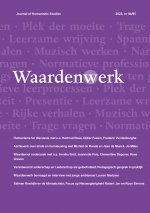
In Search for a non-anthropocentric humanism
Productgroep Waardenwerk 2023 94-95Omschrijving
A non-anthropocentric humanism is almost a contradiction in terms. But I still propose just that. Humanism explicitly places human beings at the centre, as their dignity and well-being are the goal of this thinking. In the humanism of antiquity and the Renaissance, it was felt necessary to define man as opposed to gods, animals and things. Later, in Marxism, for example, the term delineates a contrast with social and technological developments that seem to have become so independent of human beings that they are harmful to them. It stands for an ideal humanity that is promoted by education or Bildung and the norms and practices of civility. Bildung is indeed the context in which it was coined.1 So far, this is a familiar narrative. In direct opposition to this ideal and the ideas behind it, many and prominent voices such as Latour, Haraway, Descola and Chakrabarty 2 call for a decentralisation of humanity, a new world view in which non-human beings and entities are not grouped around human beings in the centre and in which the division between nature and culture is obsolete. That culture and nature were ever seen as different at all is seen as a mistake, and the thinking around it as in need of correction. And indeed, even if one considers only human life and the atrocities that have been inflicted upon it, the idea seems to have failed horribly. Looking more broadly at the world as a whole, the multiple pressing ecological crises are leading many to question the centrality of humans in the world. The label Anthropocene for the age we are in further supports this questioning: a world in which human power is the strongest force and nothing can be clearly attributed to non-human influence can even be seen as a logical consequence of humanism. The idea of decentring human beings seems to be a necessary and overdue step. The efforts for human welfare that flow from humanism, which are central to education and the many ways in which humans care for each other and the non-human world, are an important part of human agency, but they are only a part of what human agency is capable of.
